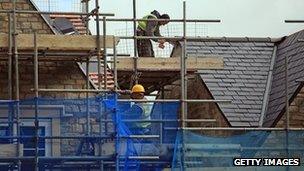New English house building falls back
- Published

The government says its programme could deliver 170,000 affordable homes
The number of new homes started by house builders in England fell again in the first three months of the year.
The Department for Communities and Local Government (DCLG) said public and private house builders started building just 24,100 new homes.
That was an 11% drop from the last three months of 2011, and a 15% drop from the first quarter of last year.
Earlier, housing groups said the government was not doing enough to fix a "burgeoning housing crisis".
The accusation came from the National Housing Federation, Shelter and the Chartered Institute of Housing.
They said homelessness was getting worse and warned that cuts to housing benefit in 2013 could exacerbate the problem.
The government replied that it had "made real progress" but had "a long way to go".
"Far from rents rising, we have seen a real terms fall in private rents and I want to see councils using the powers that they already have to tackle the small minority of rogue landlords," said Housing Minister Grant Shapps.
"I'm sure these housing organisations will welcome our <link> <caption>Affordable Homes Programme</caption> <url href="http://www.homesandcommunities.co.uk/affordable-homes" platform="highweb"/> </link> which is set to exceed expectations and deliver up to 170,000 affordable homes, and a £1.3bn investment to get Britain building."
The Affordable Home Programme was launched by the government in February last year.
It is aimed at subsidising housing associations, councils and private builders to provide 150,000 new, cheap, homes for rent or sale between 2011 and 2015.
Fewer starts
The number of new homes being started in England slumped in the wake of the 2007-08 banking crisis.
Although they subsequently started to revive, the rebound has stalled, and new starts are still 43% below their recent peak, which was reached in the year to March 2006. In that 12-month period there were 183,000 new housing starts in England.
But six years on, in the full year to March 2012, there were just 104,970 starts - which was in turn 6% down from the year to March 2011.
The DCLG argued that the market for building new homes was stable, rather than entering a new downturn.
"Since early 2010 both starts and completions have remained broadly stable with average starts of around 27,000 and average completions of 28,000 over the past nine quarters," the DCLG commented.
"This indicates that the stabilisation of starts has worked its way through to completions.
"House building is currently at approximately 65% of pre-downturn levels," the DCLG added.
'Bleak picture'
<link> <caption>The report from the housing groups</caption> <url href="http://www.housing.org.uk/news/housing_report_edition_2,_may.aspx" platform="highweb"/> </link> said that the government had to make good on its promise to get Britain building.
"This government has had two years to start delivering on housing, yet this report paints a pretty bleak picture of its current record on housing in all its forms," said Kay Boycott from the charity Shelter.
The report said that there had been a small increase in the overall number of new homes being completed, but that it was still at historically low levels.
There were 109,020 new homes completed in England last year, which was up from 103,300 in 2010, but below the average of 142,000 for the previous decade.
The latest figures show that completions rose again to 118,000 in the 12 months to March 2012.
By contrast, the National Housing and Planning Advice Unit said in 2008 that 240,000 new homes would need to be built in England each year by 2016.
Shadow housing minister Jack Dromey said the report underlined that the government was failing to tackle the worsening outlook for renters, first-time buyers and the homeless.
"They're failing to help the young couples who can't get on the housing ladder. They're failing those families struggling with high rents in the private rented sector and the millions on waiting lists. And they're failing the increasing number of people sleeping on our streets," he said.